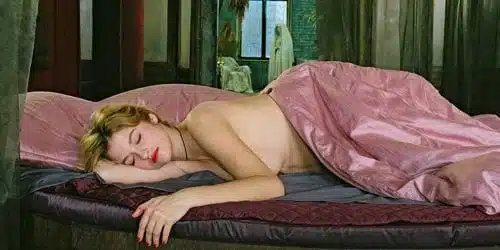
Most serious students of the cinema would probably agree that no more than, say, one out of four commercially released films is worth watching. So the box set Steamy Art House Hits, which contains four “erotically turbocharged films from Europe”, is no worse than average, containing one delightful, touching and funny movie, and three unfortunate examples of imbecilic Eurotica.
Let’s work our way upwards from the cobwebbed cellar of the European cinema, in this case occupied by a French movie called Don’t Let Me Die on a Sunday, about bored and sex-obsessed young morgue employees. Given the movie’s setting and characters, it isn’t hard to guess that the form of transgression it will concern itself with (it’s inconceivable that a movie in this genre would not focus on transgression of some sort) is not, say, cheating at baccarat or counterfeiting tickets for the Metro or cutting corners on the baking of croissants but, naturellement, necrophilia.
Complicating matters, and setting the film in motion, is the fact that the apparent victim of the necrophilia, a woman who has overdosed on Ecstasy, comes back to life, after which she and her attacker for some reason not worth explaining “embark on an odyssey that takes them into the world of sadomasochism, wild techno parties, and orgies as they search for new sensations.” Despite all of this excitement, the movie is notable mostly for its nitwit dialogue, which would appear to be, but probably is not, a parody of pretentious French cinema, such as “You find nights too long? I find life itself too long“ and, “There are two questions: Why do women have a clitoris and why’s there a God?” to which another character sagely responds, “That’s the same question.” I hit the reverse button three times to record, and revel in, this classic exchange.
The next-worst movie, Secret Things, though filled with Eurobabes, is hobbled by a Europlot. It concerns two beautiful young women who graduate from a strip club to the corridors of corporate power. The transgression du jour is incest, though the real transgression is against the arts of acting, screenwriting and direction. This movie, like many secret things, is best left undiscovered.
Only marginally better is The House of the Sleeping Beauties, a German production based on a well-known novel by Nobel laureate Yasunari Kawabata, Unlike the other two movies, it is not quite putrid, but merely unsuccessful, which in this company must be counted as a slight success.
The film focuses on a house where lonely old men pay to sleep with — literally, just sleep with — beautiful naked young women who themselves are asleep, or rather drugged, though apparently with their consent. (This point, never completely clarified, is the only thing that prevents this movie from descending from the merely pathetic into the wholly reprehensible.) The novel, itself ethically questionable (Japan is one of the developed world‘s most sexist societies), at least combined eros and pathos in reasonably even measures, but filtered through the leaden and overly literal sensibility of director Vadim Glowna, this is one boring bordello.
Glowna, who also plays the protagonist, discovers some disturbing things along the way (even more disturbing, that is, than the fact that he is paying to take naps with naked women) and the house’s madam/landlady keeps on telling him, over and over again, seemingly every 15 minutes or so of the film’s running time, “I’m really afraid I must ask you to leave,“ or “I really must ask you to go now,“ and endless variations thereof. But the film never displays any moral discernment or builds much dramatic tension beyond causing the viewer to wonder when Glowna is finally going to get kicked out — or when the movie itself is finally going to end.
The best of the four movies in this box set, Torremolinos 73, is so good, so funny and sexy and touching, that I wouldn’t be surprised if it were in the process at this very moment of being ruined by a Hollywood producer intent on a desexualized remake.
Set in Spain in 1973, the film concerns an inept door-to-door encyclopedia salesman, played by a wonderful comic actor named Javier Cámara, who is on the verge of losing his job because encyclopedia sales are declining precipitously, no doubt in anticipation of the Internet 15 years down the road. As a new corporate venture, his boss embarks on a film series called “The World Audiovisual Encyclopedia of Reproduction”. Intended for a Scandinavian audience, the films are to be real-life demonstrations of the lovemaking technique of average Spaniards, in this case Cámara and his winsome wife, Candela Peña (also wonderful.)
Camara and Candela love each other, and in conservative, Catholic Spain, still under the rule of Franco, it isn’t an easy decision for them to film themselves for a thinly disguised erotic film series. But their desperate financial situation and desire for a baby forces them to do so, and the manner in which Camara becomes, at least for a time, a mini-auteur influenced in the worst possible ways by Ingmar Bergman, and his wife a Radley Metzger-style erotic actress, is not only sweet and funny in itself but an inadvertent commentary on the transgressive trash in the rest of this box set.
Not surprisingly, the only one of these four DVDs with interesting extras is Torremolinos, in particular its collection of actual trailers from the kind of ’70s art house sex movies to which Torremolinos is paying tongue-in-cheek hommage.
The extras on the other three DVDs are completely without interest. And now I’m afraid I really must ask you to go.

